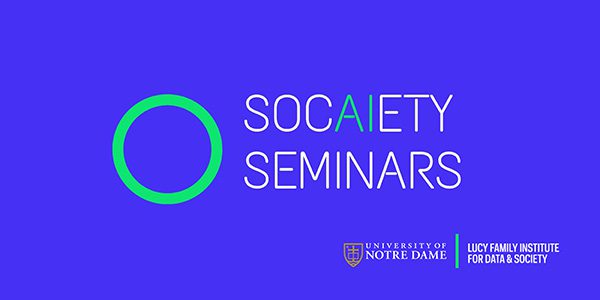Hitchcock in London: Joseph Conrad’s “The Secret Agent”
Subscribe to the ThinkND podcast on Apple, Spotify, or Google.
Featured Speakers:
- Susan Ohmer, The William T. and Helen Kuhn Carey Associate Professor of Modern Communication, University of Notre Dame
- Kieron Webb, Head of Conservation, British Film Institute
- Rev. Jim Lies C.S.C., Director for Academic Initiatives & Partnerships, University of Notre Dame, London, England
After an introduction from Fr. Jim Lies, Professor Susan Ohmer introduced Joseph Condrad’s The Secret Agent. She started by discussing the ironic tone that Conrad uses throughout the text, and explained that this was a deliberate decision from the author. Furthermore, Conrad was heavily inspired by Charles Dickens, whose books were famous for mysterious subterranean connections between his characters, which we also see in The Secret Agent. Verlac, the main character and spy in the novel, lives in many worlds: his secret career as a spy; his private life with his family; and the shop which acts as a front. Ohmer emphasizes the porousness of these worlds and the steps that Conrad took to demonstrate this..
Rereading the text, Ohmer continued, always reveals new observations that one may have missed before. She pointed out doorways as a recurring motif found in the text, and stated that they served as a point of connection for different spaces and characters in the novel.
A key theme in the novel is interconnectedness, which appears in all kinds of ways. Ohmer noted how these connections are often subtle, such as the scene where the Inspector and Assistant commissioner meet and the novel takes us back and forth between their inner thoughts as they ponder each other’s motives.
After Fr. Lies welcomes the audience back from their breakout rooms, he and Ohmer launch into a conversation and answer questions from the audience. They discussed the dedication to H.G. Wells and Ohmer noted that Wells also had novels which came out at a similar time. Conrad and Wells were friends and were both socially and politically aware and suspicious of England’s imperial ambitions. One student posed the question: “Can we trust our narrator, or does his overtly critical take reflect how we see the characters?”. Ohmer responded that this speaks again to the ironic tone of the novel, but the book takes care to show us other other nuanced perspectives.
Ohmer made note of how Conrad’s contemptuous portrayal of these characters spoke to his own political beliefs. Conrad’s father was imprisoned by the Imperial Russian government and his background made him disdainful of anarchist movements like the ones he portrays in The Secret Agent. The novel was a way of putting them in their place but Ohmer explained that this changed in later renditions of the text, especially in his portrayal of the character of Winnie, which takes a more heartfelt tone. This was reflected in Hitchcock’s adaptation, which was marketed as a melodrama because so much of it focused on Winnie’s intense emotional state.
Fr. Lies went on to ask about the directorial choices Hitchcock made in his adaptation of The Secret Agent and The Lodger. Ohmer noted that the differences were not so much directorial choices, but examples of Hollywood censorship in the 1930s. In comparison to the creative control he wielded in the 1950s, Hitchcock took on a much more limited role in his early films due to strict regulations that studios had to follow.
Fr. Lies then asked why Hitchcock selected this novel, and Ohmer explained that he was attracted to the relationship between Verlac and Winnie. Ohmer concludes by stating that despite the creative liberties taken in the film, Hitchcock often remains true to the relationship between these characters. As an example, Ohmer describes how the dialogue of the final scene is exactly the same as the final text from the book.
- Conrad was heavily influenced by Dostoevsky novels like Crime and Punishment and the Brothers Karamazov, this is demonstrated in the efforts he takes to focus on the inner thoughts and feelings of characters like Verlac and the Assistant Commissioner. [34:00]
- In the 1930s, Hitchcock did not have as much creative license as he did in his later films. He was taking on much more of a “co-ordinator role”. [30:00]
- Conrad’s ironic tone was heavily influenced by his personal and political views, he held anarchist movements of his time in great contempt, and used the characters to demonstrate this. [24:40]
- Censorship in the time period of this film was very serious, studios often had to follow a “production code” and were careful in how they portrayed things like sexuality and relationships, even how bombs were created. [28:12]
- “London like many historical cities is always changing” (Susan Ohmer, 20:10)
- “We often think of HG Wells in terms of science fiction and the war of the worlds, but it is interesting that Conrad reminds us of his social and political interests.” (Susan Ohmer, 21:32)
- “Conrad is writing in the era of late Henry James, and early Virginia Woolf…writers are interested in the different perspectives one can take, so stories are not linear.” (Susan Ohmer, 23:26).
- “One of the beauties of the novel is that you could rub shoulders with these people on the street and you would not know it.” (Susan Ohmer, 35:12)
- “Conrad has a very jaundiced view of organizations… There are circles of exploitation and manipulation, and it speaks to a moment where an industrialized nation is experiencing the effects of imperialism and colonial rule that he would have seen as a Seaman. He is exploring how this exploitation operates globally, but also in this society of spies.” (Susan Ohmer, 38:49).
Related Content
Reunion 2024
Alumni Education Programming Click each program title to learn more. ND Perspectives: Election 2024 and the Future of Democracy in the U.S. The 2024 presidential election looms...
Read ArticleA Brave New World of AI Governance
Explore the connection between data, geopolitics and governance, regulation, self-regulation while discovering examples of good and bad practices in various sectors, such as...
View EventAlgorethics: potentiality and challenges in the age of AI
Explore the possibilities and challenges in ethical governance of AI through algorethics. Algorethics is a term that has been developed since 2018 to denote the need for a study...
View Event

